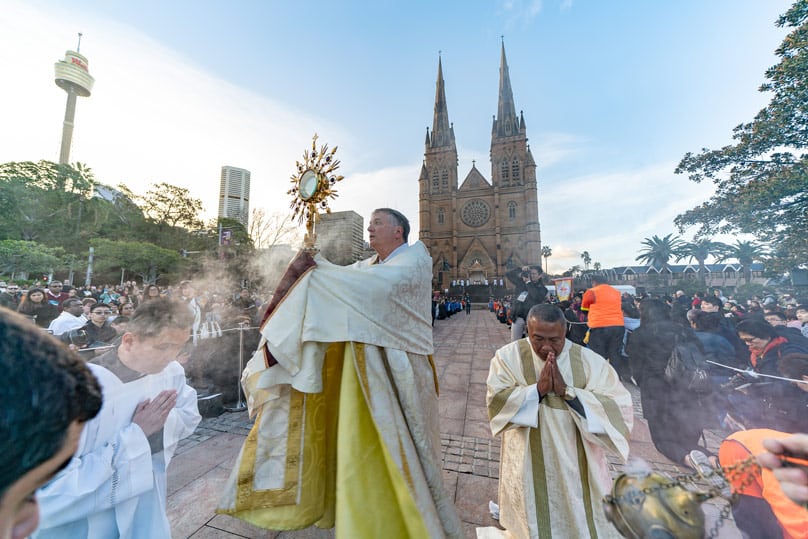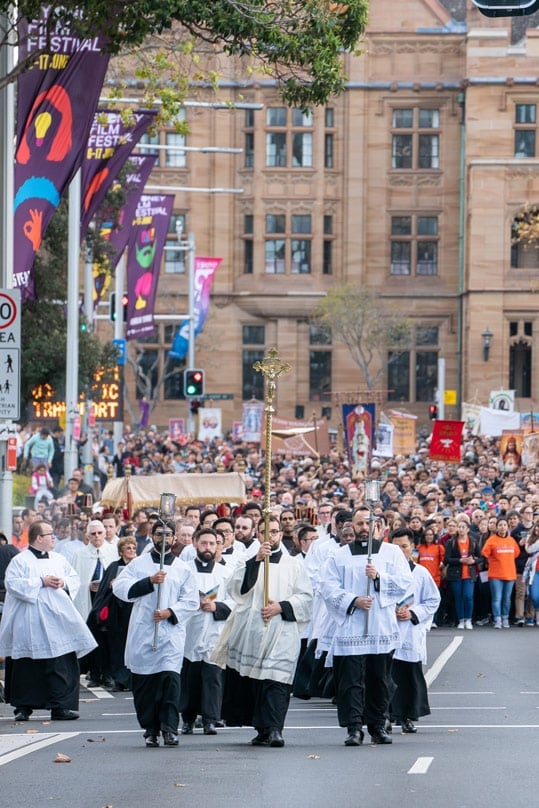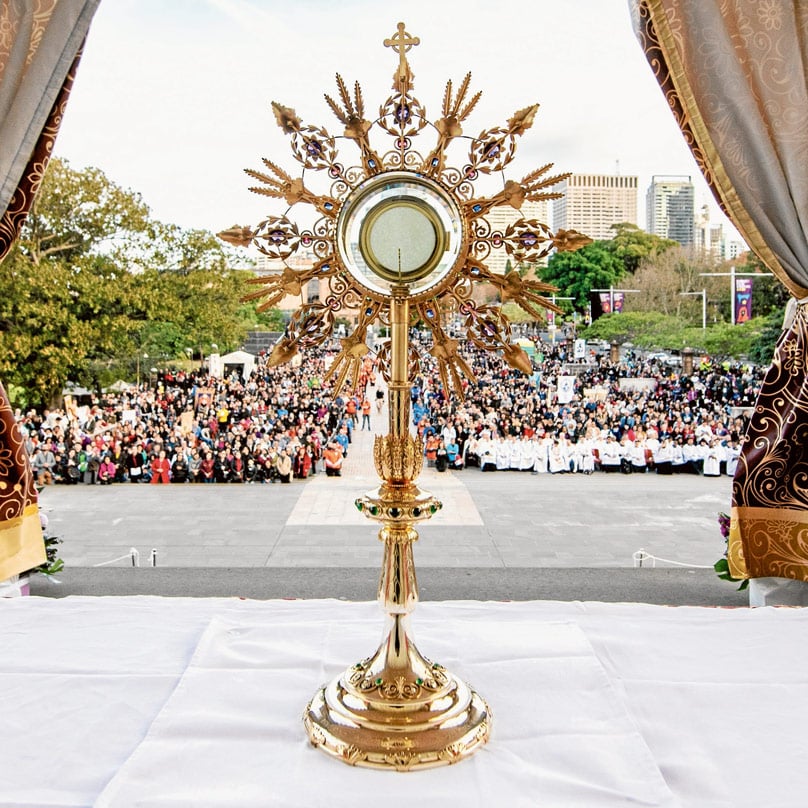
When Pope Urban IV decided to extend the feast of Corpus Christi to the universal Church, he wisely chose the great Dominican theologian, St. Thomas Aquinas, to compose the Mass and Liturgy of the Hours for this great feast. Thus he bequeathed to us the Sacris Solemniis with its Panis Angelicus, the Verbum Supernum, the Lauda Sion, the Adoro te Devote, and most popular of all Eucharistic hymns, the Pange Lingua (Sing, my tongue, the Saviour’s glory) with its last two verses, the Tantum ergo, which was our entrance hymn tonight.
What was Aquinas’ bright idea about the Eucharist that made Sing, my tongue the most popular Eucharistic hymn ever since? Well, in one short hymn St Thomas suggests that the central mysteries of our faith are all contained in the words “Body of Christ” that the priest says to us as we receive Holy Communion. Let me explain…
First, the Body of Christ is God, the only-begotten Son of the Father, true God from true God, who came down from heaven. As we sang in our hymn, He was “Destined, for the world’s redemption, from a noble womb to spring” and “Of a pure and spotless virgin, Born for us on earth below.” The Blessed Sacrament is the Word-made-flesh, God-made-baby, first worshipped in Bethlehem by angels and men, by high kings and lowly shepherds. So when the priest says ‘Corpus Christi – the Body of Christ’ and you say ‘Amen’, you are assenting to the mystery of the Incarnation as Mary did, you are saying, yes Lord, I believe, I love you, I need you!
Secondly, the Body of Christ is Jesus. The Word spoken by the Father from all eternity is now preached in time to all humanity, the story of God in sermon and parable, signs and wonders. And so following St Thomas we sing of Him: “He, as Man, with man conversing, Stayed, the seeds of truth to sow; Then He closed in solemn order, Wondrously His life of woe.” Truth, indeed, Jesus sewed in the soil of our minds and hearts and imaginations. So when the priest says ‘Corpus Christi – the Body of Christ’ and you say ‘Amen’, you assent to the mystery of Christ’s Teachings as the apostles did, you say, yes Lord, I believe, I love you, I need you!
Thirdly, the Body of Christ is our Salvation. As we sing, it is of “the Saviour’s glory”, for He is “the Paschal victim”, “destined, for the world’s redemption”. For our sake and for our salvation He was crucified under Pontius Pilate, suffered death and was buried, and rose again on the third day. When the priest says ‘Corpus Christi – the Body of Christ’ and you say ‘Amen’, you are assenting to the mystery of the Redemption as every sinner must, you are saying, yes Lord, I believe, I love you, I need you!

Fourthly, the Body of Christ is Communion. As we sing: “On the night of that Last Supper Seated with His chosen band… Then as Food to all His brethren Gives Himself with His own Hand” and “Word made flesh, the bread of nature, By His word to flesh He turns; Wine into His blood He changes: What though sense no change discerns?” So when the priest says ‘Corpus Christi – the Body of Christ’ and you say ‘Amen’, you assent to the mystery of the Eucharist as every communicant does, you say, yes Lord, I believe, I love you, I need you!
Fifthly, the Body of Christ is the Church. the one, holy, Catholic and apostolic church… the communion of saints is the mystical body of Christ. In her “Lo! O’er ancient forms departing, Newer rites of grace prevail; Faith, for all defects supplying” and in her worship and song “Be salvation, honour, blessing, Might and endless majesty” to the Eternal Trinity. When the priest says ‘Corpus Christi – the Body of Christ’ and you say ‘Amen’, you are assenting the mystery of the Church as every member does, you are saying, yes Lord, I believe, I love you, I need you!
So the Feast of Corpus Christi is not just an excuse to chant some great gothic poetry and or to sing some nearly-as-good neo-gothic hymnody: it is, rather, the close of those ancient rites described in our first reading (Ex 24:3-8); the advent of the new covenant, told in our Gospel (Mk 14:12-16,22-26), and the bridge between them related in our epistle (Heb 9:11-15). The Holy Eucharist is many things: offering, blessing, remembrance, thanksgiving, intercession, communion, pledge, anticipation, mission.
But to say it is “the source and summit of the Christian life” as the Second Vatican Council famously did (LG 11; CCC 1324), is to say it somehow reprises all the central mysteries of our faith. In brief, the Eucharist is the sum and the summary of our faith (CCC 1327), or as St Irenaeus put it, “Our way of thinking is attuned to the Eucharist, and the Eucharist in turn confirms our way of thinking.” (Adv. Haeres. 4, 18, 5)

A few months ago Pope Francis reminded us that over the past two millennia many Christians have been persecuted and even died defending the Eucharist. Two centuries ago Australian Catholics were persecuted for their Eucharistic faith and denied both priests and Mass. Indeed, as a pre-condition to assuming office, the first several Governors of New South Wales were required to swear that there was “no transubstantiation in the Sacrament of the holy table”.
Still today, in some parts of the world, people risk their lives in order to participate in Sunday Mass. The Holy Father recalled that “In the year 304, during the Diocletian Persecution, a group of Christians from North Africa was surprised as they were celebrating Mass in a house, and were arrested. In the interrogation, the Roman Proconsul asked them why they had done so, knowing that it was absolutely prohibited.
They responded: ‘Without Sunday we cannot live’ – which meant: without the Eucharist our Christian life would die.” Those fourth century North Africans challenge us still, Pope Francis suggests: What does it mean for each of us to partake in the Sacrifice of the Mass and approach the Lord’s Table?
Corpus Christi, the Body of Christ, is the Incarnation and Redemption, the Sacrifice and Sacrament, the Teaching and Action of the Church, all rolled into one moment, when Christ gives us all He is and we say ‘Amen’ to receiving Him. Yes Lord, I believe, I love you, I need you!
This is the homily given by Archbishop Anthony Fisher OP for Mass of the Solemnity of the Most Holy Body and Blood of Christ.
It was given at St Mary’s Cathedral, Sydney, Corpus Christi, 3 June 2018, at 6pm.
